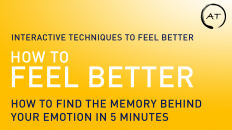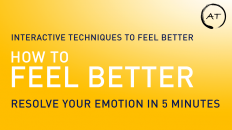We know that we have emotions all the time and that some of these emotions are making our lives worse. The key to feeling better is finding emotions to release and improve.
So how do you actually find emotions to work on? This post will describe just that by outlining the basic foundation of emotional practice.
Emotional practice consists of finding and improving emotions. Over time, you will feel better and better as you work through more emotions.
The basic practice is this:
- Find emotions that are blocking or detracting from your life.
- Examine the memory behind the emotion.
- Change incorrect assumptions or fully accept the emotion to feel better.
- Repeat.
You can follow how to do steps 2 and 3 in these two technique pages:
But finding emotions to work on is a little harder. I’l tell you the things that work for me.
Every night, I quickly walk through my day. I try to remember everything that happened and how I felt during the day. If I felt a negative emotion during the day, I write it down in a daily log entry. This process takes about 2 minutes for normal days and 10 minutes for crazy days.
Afterwards, I look at what I felt. In general, I have found between 0 and 3 emotions to work through each day. I do our typical deep dive to release the negative emotion.
Then I compare today’s feelings to how I felt in the past few days. If I see a trend, I ask why. If my negative emotions keep repeating, then there is probably a deeper emotion/memory at work. I try to find the deeper emotion because those emotions are the ones that make every moment of our lives worse.
The next thing I do is to look at my goals. For each goal I have, I try to feel what it would be like to achieve that goal. Inevitably, negative emotions around the goals come up. There may be worry about the future or some resistance to pushing myself out of my comfort zone. I work through these emotions that hold me back.
I’ve been doing these daily entries for the better part of a decade. Taking ten minutes each day has continuously improved my life.
The other part of emotional practice is noticing when you have a really intense emotion. Whenever this happens, make a note of it. You should come back to your intense emotions during your daily or weekly emotional practice. Working on these emotions will generally help you with your current situation. Conflicts can resolve almost magically when you release the emotion around the issue. Adversaries can become friends. Activities we are scared of can become fun. You will notice a material improvement in your current life by working on your emotions.


